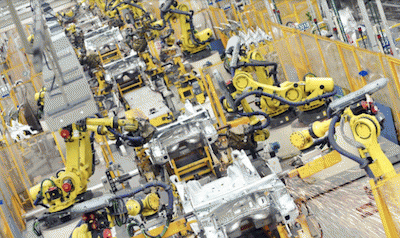Robots Create
Made in the USA Jobs By Joel D. Joseph, Chairman,
Made in the USA Foundation
In the
long run, many economists think that automation and robotics are going to
replace a significant percentage, if not the majority, of manufacturing jobs.
However, most of those job losses will be in low-wage countries
where unskilled workers are doing routine, mind-numbing jobs. Despite an
increase in robots on the assembly line, the United States has added more than
25,000 manufacturing jobs during 2016.
In
April, 12.4 million Americans worked in manufacturing, according to the U.S.
Bureau of Labor Statistics. That's up by 27,000 jobs from a year prior, and
almost a million from early 2010. One reason for the increase
in American jobs: Last year, for the first time in decades, more manufacturing
jobs came back to the United States than left. In 2016, there was a
net gain of 27,000 jobs. That reflects a loss of about 50,000 jobs that left
the country, combined with a gain of 77,000 jobs that returned to the U.S. or
are a result of foreign companies investing in U.S. factories.
Where Do These Jobs Come
From? The
bulk of these new jobs -- about 60 percent from 2010 through 2016 -- came from
China. Labor has become more expensive in China, with Chinese
wages going up 12 percent to 15 percent a year for the past 15 years.
Thousands of jobs have also come back from Mexico and South Korea as well. In the
first quarter of 2017, U.S. companies bought 32 percent more robots than
the same period last year, according to data from the Robotic Industries
Association. The reason for the increase? Robots have become
cheaper. Adidas
announced that it is opening a new factory in Georgia that will be highly robotized,
with about 160 human workers. Adidas is a German company that never
manufactured shoes in the United States before. Marlin Steel, for
example, in Baltimore was able to stay in business by automating its production
to stay competitive when many other manufacturing jobs went overseas.
Robots make manufacturing in the United States more efficient and thus more
competitive.
Concerns about Automation Aren't New Workers
have been worrying about automation wiping out jobs for
centuries. The Luddites were a group of English textile
workers and weavers in the 19th century who destroyed weaving machinery as a
form of protest. Ninety-eight percent of the work of a weaver became
automated. and understandably, the workers rebelled. However, over a
period of years the number of textile workers actually grew.
At the beginning of the 19th century, it was so expensive to make apparel that
a typical person had one outfit of clothing. As costs started
dropping because of automation, people started buying more and more, so that by
the 1920s the average person was consuming ten times as much cloth per
capita per year. More demand for cloth meant a greater need for
textile workers.
In
1900, 41% of American workers were employed in agriculture, but by 2000,
automated machinery, such as tractors and harvesting equipment, brought that
down to just 2%, MIT professor David Autor wrote in the
Journal of Economic Perspectives in 2015.
Farmers moved to cities and took other jobs while food became less expensive.
The arrival
of the automobile ushered out horses, reducing the need for blacksmiths
and stable hands, but the auto industry created many more jobs than the
horse-drawn economy lost.
In the
21st century, computers are performing tasks humans once did, making workers
more productive. When ATMs were introduced in the 1970s, people thought
they would be the death knell for bank tellers. The number of tellers per bank
did fall, but because ATMs reduced the cost of operating a bank branch, more
branches opened, which in turn hired more tellers. U.S. bank teller
employment rose by 50,000 from 1980 to 2010.
The Future of American Jobs Are we
headed for a 15-hour work-week? That's what noted economist John Maynard Keynes
predicted in his famous 1930 essay
Economic Possibilities for Our
Grandchildren. He said that in the next
century technology would make us so productive we wouldn't know what to do with
all our leisure time. It hasn't quite worked out that way yet, but we do
have shorter hours now than 80 years ago. As a
nation, we should strive for a shorter work-week. Americans work longer
hours than workers in Europe where a 35-hour work-week is the norm.
Europeans also enjoy six weeks of vacation, while Americans have two weeks off
per year.
Robots may cause a loss of jobs in Asia by replacing workers who do routine,
monotonous work. But in wealthy countries, like the United States, robots
will create jobs and increase efficiency, much like farm equipment liberated
farmers and farm children to do other things.





